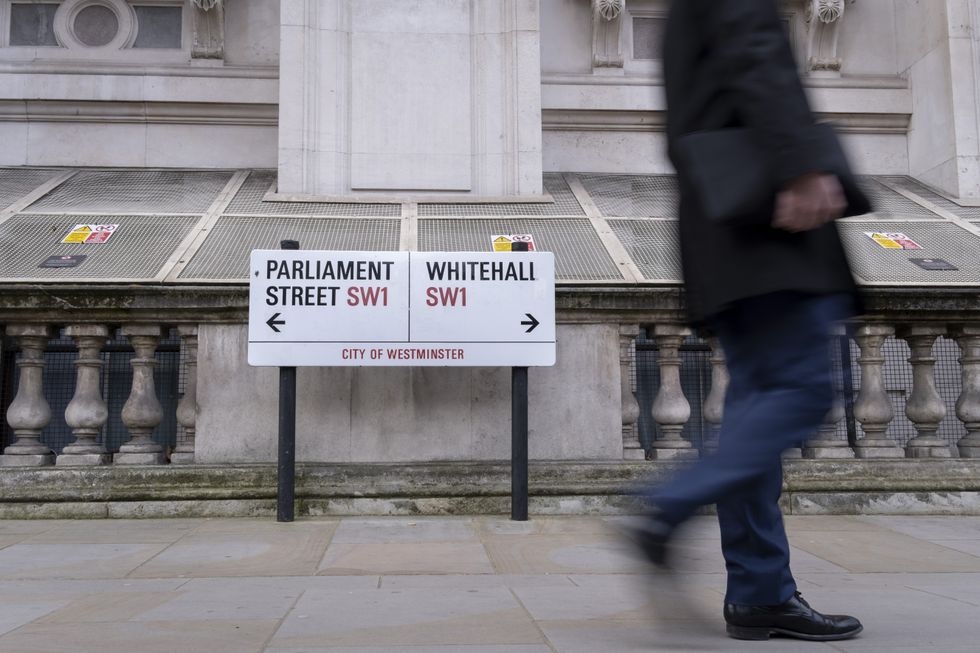Georgina Cutler
Guest Reporter
MPs have issued a stark warning that the traditional British pint could be under threat thanks to new legislation currently being debated.
The Product Regulation Bill, which aims to review alcohol measures, has sparked concerns among parliamentarians who fear it could be exploited by future governments to reduce drink sizes.
The controversy centres around concerns that the legislation could potentially open the door to replacing the beloved pint with smaller measures, prompting calls for protective amendments to the bill.
Former minister Lord Sharpe has warned that future governments could potentially misuse the bill's powers.
In a warning to fellow peers, he highlighted the risk of the role of Secretary of State being held by a "metric maniac."
His particular concerns focus on the possibility of the traditional British pint being replaced by the Australian schooner.
Lord Sharpe described the schooner as "an abomination of a vessel, marginally too large for a sensible sherry but far too small for a sensible beer."
"It is not difficult to imagine... some interfering busybody who decides that they know what is better for the health of the nation than those who make up the population of the nation," he warned peers.
A Government spokesperson said: "Pints of draught beer and cider remain part of our national identity. We have no plans to change this."
FOLLOW BELOW FOR LIVE UPDATES THROUGHOUT THE DAY
Kevin Hollinrake has accused Labour of manipulating its housebuilding strategy to reduce construction in urban areas while increasing development in the countryside.
While expressing support for building more homes, he emphasised the importance of placing them in “the right places.”
Speaking to GB News, the shadow housing secretary said: “This is typical socialism at work, shifting housebuilding out of urban areas to green belt and rural locations. That’s not right.”
Hollinrake also claimed that Labour’s approach could result in some rural areas facing a fivefold increase in local housing targets.

Kemi Badenoch has signalled potential openness to collaborate with Reform UK.
The Tory leader emphasised the importance of building alliances with those who share similar values.
"I've always said we need to make sure we build a coalition of people who share our values," Badenoch told The Spectator.
Her comments come at a time of increasing speculation about potential political realignments within the right-wing political sphere.
Badenoch acknowledged the complex dynamics of voter allegiance.
"There are many people who vote Conservative who will not vote Reform. What I'm trying to do is maintain the coalition that we do have."
It comes after Farage surged ahead to become the favourite to replace Sir Keir Starmer as Prime Minister at the next election - as he suggested the Tories in “much deeper trouble” than they realise.

Ministers are planning to slash over 10,000 civil service jobs as Whitehall departments face pressure to meet spending limits under a new government efficiency initiative.
Sources indicated a growing consensus that the civil service had become overly large and unwieldy, largely due to its expansion to address the demands of Brexit and the Covid pandemic, according to information obtained by the Guardian.
With Chancellor Rachel Reeves requiring departments to implement 5 per cent budget reductions as part of a spending review, insiders suggested that job cuts are unavoidable.
A Cabinet Office source acknowledged that departments would need to make some “very hard choices” about staffing levels to remain within Treasury-mandated budgets.
Pat McFadden, the Cabinet Office minister said: "We don’t have a target for headcount.
"My focus is on making the people who work for us into being as productive as they possibly can. That’s why those efficiencies that the chancellor announced in the budget are important and there will be more to come. And technology should help us become more productive in the future."

Councils will be required to build homes to address England’s housing crisis, says Sir Keir Starmer.
Binding targets will mandate the construction of 370,000 homes annually, with the Government specifying targets for each area.
Starmer has emphasised the urgency of the issue saying: “We owe it to working families to act now.”
Alongside housing secretary Angela Rayner, Starmer announced that the revised National Planning Policy Framework will set area-specific targets and, for the first time, define the "grey belt."
These measures aim to deliver on the Government’s commitment to construct 1.5 million homes during the next parliamentary term.
The Prime Minister said: “For too long, hardworking people have been denied the stability of homeownership.With a generation facing a distant dream of owning a home and homelessness at record levels, the crisis cannot be ignored.
"Our Plan for Change will prioritise builders over blockers, fix the broken planning system, provide homes for working families, and foster economic growth that benefits everyone."
Find Out More...
The Product Regulation Bill, which aims to review alcohol measures, has sparked concerns among parliamentarians who fear it could be exploited by future governments to reduce drink sizes.
The controversy centres around concerns that the legislation could potentially open the door to replacing the beloved pint with smaller measures, prompting calls for protective amendments to the bill.
Former minister Lord Sharpe has warned that future governments could potentially misuse the bill's powers.
In a warning to fellow peers, he highlighted the risk of the role of Secretary of State being held by a "metric maniac."
His particular concerns focus on the possibility of the traditional British pint being replaced by the Australian schooner.
Lord Sharpe described the schooner as "an abomination of a vessel, marginally too large for a sensible sherry but far too small for a sensible beer."
"It is not difficult to imagine... some interfering busybody who decides that they know what is better for the health of the nation than those who make up the population of the nation," he warned peers.
A Government spokesperson said: "Pints of draught beer and cider remain part of our national identity. We have no plans to change this."
FOLLOW BELOW FOR LIVE UPDATES THROUGHOUT THE DAY
Reform UK chairman slams PM over net migration as Zia Yusuf suggests Starmer does not 'understand supply and demand'
— (@)
Tories accuse Labour of 'gerrymandering' new housing developments away from urban areas
Kevin Hollinrake has accused Labour of manipulating its housebuilding strategy to reduce construction in urban areas while increasing development in the countryside.
While expressing support for building more homes, he emphasised the importance of placing them in “the right places.”
Speaking to GB News, the shadow housing secretary said: “This is typical socialism at work, shifting housebuilding out of urban areas to green belt and rural locations. That’s not right.”
Hollinrake also claimed that Labour’s approach could result in some rural areas facing a fivefold increase in local housing targets.
Kemi Badenoch signals willingness to collaborate more closely with Reform UK

Kemi Badenoch has signalled potential openness to collaborate with Reform UK.
The Tory leader emphasised the importance of building alliances with those who share similar values.
"I've always said we need to make sure we build a coalition of people who share our values," Badenoch told The Spectator.
Her comments come at a time of increasing speculation about potential political realignments within the right-wing political sphere.
Badenoch acknowledged the complex dynamics of voter allegiance.
"There are many people who vote Conservative who will not vote Reform. What I'm trying to do is maintain the coalition that we do have."
It comes after Farage surged ahead to become the favourite to replace Sir Keir Starmer as Prime Minister at the next election - as he suggested the Tories in “much deeper trouble” than they realise.
Ministers plan to slash more than 10,000 civil service roles

Ministers are planning to slash over 10,000 civil service jobs as Whitehall departments face pressure to meet spending limits under a new government efficiency initiative.
Sources indicated a growing consensus that the civil service had become overly large and unwieldy, largely due to its expansion to address the demands of Brexit and the Covid pandemic, according to information obtained by the Guardian.
With Chancellor Rachel Reeves requiring departments to implement 5 per cent budget reductions as part of a spending review, insiders suggested that job cuts are unavoidable.
A Cabinet Office source acknowledged that departments would need to make some “very hard choices” about staffing levels to remain within Treasury-mandated budgets.
Pat McFadden, the Cabinet Office minister said: "We don’t have a target for headcount.
"My focus is on making the people who work for us into being as productive as they possibly can. That’s why those efficiencies that the chancellor announced in the budget are important and there will be more to come. And technology should help us become more productive in the future."
Councils forced to build homes to resolve England’s housing crisis, PM says

Councils will be required to build homes to address England’s housing crisis, says Sir Keir Starmer.
Binding targets will mandate the construction of 370,000 homes annually, with the Government specifying targets for each area.
Starmer has emphasised the urgency of the issue saying: “We owe it to working families to act now.”
Alongside housing secretary Angela Rayner, Starmer announced that the revised National Planning Policy Framework will set area-specific targets and, for the first time, define the "grey belt."
These measures aim to deliver on the Government’s commitment to construct 1.5 million homes during the next parliamentary term.
The Prime Minister said: “For too long, hardworking people have been denied the stability of homeownership.With a generation facing a distant dream of owning a home and homelessness at record levels, the crisis cannot be ignored.
"Our Plan for Change will prioritise builders over blockers, fix the broken planning system, provide homes for working families, and foster economic growth that benefits everyone."
Find Out More...